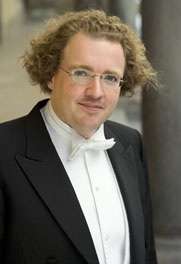|
Back
Guts and Glory Miami
New World Center, Miami Beach
11/10/2012 - & November 11*, 2012
Arthur Honegger: Symphony No. 3, “Liturgique”
Felix Mendelssohn: Violin Concerto No. 2 in E minor, Opus 64
Sergei Prokofiev: Selections from Cinderella, Opus 87
Renaud Capuçon (violin)
New World Symphony, Stéphane Denève (conductor)

S. Denève (Courtesy of NWS)
It was ambitious of New World to take a chance with something not offered very often in South Florida. And probably it is not so easy to play being a piece that does not have a well-established performance history in this country. But New World has been encouraging audiences to explore the less familiar.
Honegger's Third sounds nothing like, for example, a Beethoven symphony. With Beethoven, there is always an accessible beauty even when it is at its most serious and sad. With Honegger we must give more. Beethoven's angst comes from something much more internal, where Honegger's power comes from his response to the outside world. The terror in Europe during the time in which he composed could not help but shape his work. Anyone who appreciates Symphony Liturgique has made a considerable commitment. With an opening sound like the rustling of leaves, it immediately cries out a terrifying warning, perhaps a destruction is underway. The contemplative second movement is not relieving, but more like a time of healing; beautiful though not yet safe. Moments of intense yet relatively quiet pain are soothed with a tender flute. The march of the last movement may at first remind one of The Pines of Rome without cheerful triumph, instead a final severe battle that may clear the way for a hopeful future. The final heartbreaking song of the bird is particularly moving here, though Honegger does not give false hope that even this peace will last. This is a monumental symphony, a veritable opera without vocals. The orchestra's command is guided carefully by conductor Stéphane Denève who is true to the subtlety of French music and never finds false sentimentality. Tears are more likely to come from fatigue than emotion.
This is a demanding work, not just for orchestra but in particular for an audience not prepared. Mr. Denève gave a very thorough introduction to the symphony using the orchestra to indicate important themes to anticipate. At the same time, Honegger's work doesn't really benefit from over-explanation. The music is very literate with rhythms guiding the listener to easy comprehension. It is once again evident how much movies owe to the path set by great twentieth century composers like Honegger.
Next up was the familiarViolin Concerto of Mendelssohn. For many of us, this is one we can never tire of, you can't help but look forward to a new interpretation. Renaud Capuçon clearly had a strategy in respecting Mendelssohn by not lingering on potential sappiness which can often happen during the second movement. This time violinist and conductor kept up a brighter tempo than one usually expects resulting in a fluid performance never short on emotion and command. Though I might sound like a snob, somehow wouldn't it feel nobler for an audience to give a seated ovation rather than exhibiting the hysteria expected at a rock concert. In any case, Mr. Capuçon's orginal voice made a tremendous impact.
The conclusion to this rich program was a suite from Prokofiev's ballet version of Cinderella. Prokofiev arranged several suites from this work but Denève has wisely chosen to create his own. The music for the complete ballet is quite lengthy; one will find plenty of recordings of the suites that Prokofiev created not just for orchestra but also solo piano. On recording the piano versions do not make much of an impression. Perhaps because the work's tremendous color requires a complete orchestra to express fully its ambitions. Prokofiev wrote a great score, one with which most people are not familiar. Those who are tired of the Cinderella story will think differently after hearing this Russian approach. The romance of the “Amorosa” and “Grand Waltz,” the humor of the sisters fighting over a piece of clothing and the fear created by the midnight warning are examples of richly detailed writing that must be a feast for choreographers.
After seeing the success of last season by offering Bartók's Bluebeard's Castle it can't help but encourage one to fantasize that Denève might return with a program offering Honegger's Jeanne d'Arc au bûcher, Mendelssohn's Elijah or one of Prokofiev's cantatas. Mr. Denève's imagination, commitment and enthusiasm will long be remembered for its mark on the maturity of South Florida's musical scene.
Jeff Haller
|